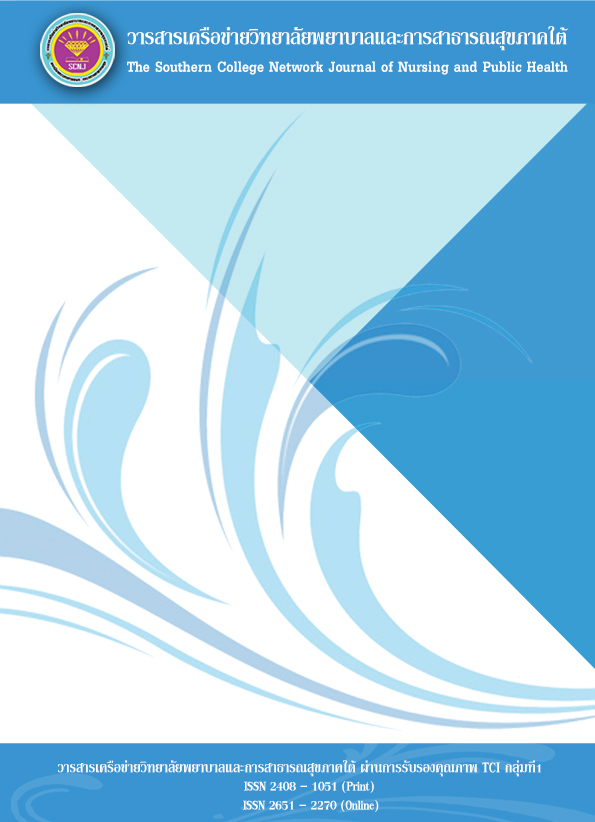ผลของโปรแกรมส่งเสริมสมรรถนะแห่งตนต่อพฤติกรรมการรับประทานอาหาร และการออกกำลังกายของหญิงตั้งครรภ์ที่เป็นเบาหวาน
คำสำคัญ:
โปรแกรมส่งเสริมสมรรถนะแห่งตน, เบาหวานขณะตั้งครรภ์, พฤติกรรมการรับประทานอาหาร, พฤติกรรมการออกกำลังกายบทคัดย่อ
การวิจัยกึ่งทดลองครั้งนี้ มีวัตถุประสงค์เพื่อศึกษาผลของโปรแกรมส่งเสริมสมรรถนะแห่งตนต่อพฤติกรรมการรับประทานอาหาร และการออกกำลังกายของหญิงตั้งครรภ์ที่เป็นเบาหวาน กลุ่มตัวอย่างเป็นหญิงตั้งครรภ์ที่เป็นเบาหวาน ที่เข้ารับบริการที่แผนกฝากครรภ์ โรงพยาบาลมหาราชนครศรีธรรมราช ระหว่างเดือนกรกฎาคม ถึงเดือนตุลาคม พ.ศ.2559 คัดเลือกกลุ่มตัวอย่างตามคุณสมบัติที่กำหนด จำนวน 50 ราย แบ่งเป็นกลุ่มทดลองที่ได้รับโปรแกรมส่งเสริมสมรรถนะแห่งตน จำนวน 25 ราย และกลุ่มควบคุมที่ได้รับการพยาบาลตามปกติ จำนวน 25 ราย เครื่องมือที่ใช้ในการวิจัยประกอบด้วย 2 ส่วน คือ 1) เครื่องมือที่ใช้ในการทดลอง คือ โปรแกรมส่งเสริมสมรรถนะแห่งตน และ 2) เครื่องมือที่ใช้ในการเก็บรวบรวมข้อมูล คือ แบบสอบถามข้อมูลส่วนบุคคล แบบสอบถามพฤติกรรมการรับประทานอาหาร และแบบสอบถามพฤติกรรมการออกกำลังกาย เครื่องมือดังกล่าวได้ผ่านการตรวจสอบความตรงเชิงเนื้อหาโดยผู้ทรงคุณวุฒิ 3 ท่าน และหาค่าความเที่ยงโดยใช้ค่า สัมประสิทธิแอลฟาของครอนบาคของแบบสอบถามพฤติกรรมการรับประทานอาหารและแบบสอบถามพฤติกรรมการออกกำลังกายได้ .84 และ.81 ตามลำดับ วิเคราะห์ข้อมูลด้วยสถิติพรรณนา และสถิติทดสอบค่าทีผลการวิจัยพบว่า
กลุ่มทดลองหลังได้รับโปรแกรมส่งเสริมสมรรถนะแห่งตน มีคะแนนเฉลี่ยพฤติกรรมการรับประทานอาหาร (M=51.24, SD=2.63) และพฤติกรรมการออกกำลังกาย และ (M=46.08, SD=4.74) สูงกว่าก่อนได้รับโปรแกรม (M=36.04, SD=3.82 และ M=27.80, SD=7.48 ตามลำดับ) อย่างมีนัยสำคัญทางสถิติ (p<.001) และกลุ่มทดลองหลังได้รับโปรแกรมการส่งเสริมสมรรถนะแห่งตน มีคะแนนเฉลี่ยพฤติกรรมการรับประทานอาหาร (M=51.24, SD=2.63) และพฤติกรรมการออกกำลังกาย (M=46.08, SD=4.74) สูงกว่ากลุ่มควบคุม (M=33.60, SD=3.24 และ M=29.92, SD=4.45 ตามลำดับ) อย่างมีนัยสำคัญทางสถิติ (p<.001)
สรุปได้ว่า โปรแกรมส่งเสริมสมรรถนะแห่งตนสามารถทำให้หญิงตั้งครรภ์ที่เป็นเบาหวาน มีพฤติกรรมการรับประทานอาหารและการออกกำลังกายที่เหมาะสม จึงควรนำไปใช้ในการออกแบบกิจกรรมการพยาบาลในระยะตั้งครรภ์เพื่อส่งเสริมการควบคุมระดับน้ำตาลในเลือด
เอกสารอ้างอิง
Bandura, A. (1997). Self-Efficacy: The Exercise of Control. New York: W.H. Freeman.
Cunningham, F. G., Leveno, K. J., Bloom, S. L., Hauth, J. C., Rouse, D. J., & Spong, C. Y. (2010). Williams Obstetrics. (23rd ed.). New York: McGraw-Hill.
Duncombe, D., Wertheim, H. E., Skouteris, H., Paxton, J. S., & Kelly, L., (2009). Factors Related to Exercise Over the Course of Pregnancy Including Women’s Beliefs about the Safety of Exercise During Pregnancy. Midwifery, 25, 430-438.
Ehirlich, S. F., Hedderson, M. M., Feng, J. M., Devenport, E. R., Gunderson, E. P., & Ferara, A. (2012). Change in Body Mass Index Between Pregnancies and the Risk of Gestational Diabetes in a Second Pregnancy. Obstetrics and Gynecology, 117, 1323-1329.
Ferrara, A., Hedderson, M. M., Ching, J., Kim, C., Peng, T., & Crites, Y. M. (2012). Referral to Telephonic Nurse Management Improves Outcomes in Women with Gestational Diabetes. American Journal of Obstetrics Gynecology, 206(6), 491. el - 491.e5. doi: 10.1016/j.ajog.2012.04.019
Hussain, Z., Yusoff, Z. M., & Sulaiman, S. A. S. (2014). A Study Exploring the Association of Attitude and Treatment Satisfaction with Glycemic Level among Gestational Diabetes Mellitus Patients. Primary Care Diabetes, 93, 184-190.
Junthong, P. (2012). The Effects of Participatory Learning Program on Diet Control Behavior among Pregnant Woman with Gestational Diabetes Mellitus. Master of Nursing Science Thesis in Advance Midwifery Khon Kaen University, Khon Kaen. (in Thai)
Kanthiya, K., Luangdansakul, W., Wacharasint, P., Prommas, S., & Smanchat, B. (2013). Prevalence of Gestational Diabetes Mellitus and Pregnancy Outcomes in Women with Risk Factors Diagnosed by IADPSG Criteria at Bhumibol Adulyadej Hospital. Thai Journal of Obstetrics and Gynecology, 21, 141-149. (in Thai)
Kim, C., Mc Ewen, L. N., Kieffer, E. C., Herman, W. H., & Piette, J. D. (2008). Self-Efficacy, Social Support, and Associations with Physical Activity and Body Mass Index among Women with Histories of Gestational Diabetes Mellitus. Diabetes Education, 34, 719-728.
Klankhajhon, S. (2008). Selected Factors Predicting Exercise Behavior of Pregnancy Women. Unpublished Master’s Thesis, Mahidol University, Bangkok, Thailand. (in Thai)
Limruangrong, P., Sinsuksai, N., Ratinthorn, A., & Boriboonhirunsarn, D. (2011). Relationship among Selected Factors, Exercises, and Two-Hour Postprandial Blood Glucose Levels in Pregnant Women with Gestational Diabetes Mellitus. Journal of Nursing Science, 29(suppl2), 48-59. (in Thai)
Lonuch, S., Nirattharadorn, M., & Khampalikit S. (2011). Predicting Factors of Nutritional Promoting Behaviors among Pregnant Women Over 35 Years of Age. Journal of Nursing and Education, 4(2), 79-93.
Mahavong, J. (2008). Effect of Education Program and Spouse Support on Health Promoting Behaviors and Glycemic Control in Pregnancy Women with Gestational Diabetes Mellitus. Master of Nursing Science Thesis in Maternity and Newborn Nursing Mahidol University, Nakhon Pathom. (in Thai)
Mapakdee, P. (2008). Effects of Using the Participatory Learning Program and Telephone Visit on Knowledge, Self-Care Behaviors, and Blood Sugar Level Among Gestational Diabetic Women. Master of Nursing Science (Nursing Care of Women) Chiang Mai University, Chiang Mai. (in Thai)
Mornsaeng, I. (2009). Effect of Self-Efficacy Enhancement Program on Exercise Behavior among Pregnant Women. Master of Nursing Science Thesis in Advanced Midwifery Chiang Mai University, Chiang Mai. (in Thai)
Oostdam, N., Van Poppel, M., Wouters, M., & Mechelen, W. (2011). Interventions for Preventing Gestational Diabetes Mellitus: A Systematic Review and Meta-Analysis. Journal of Women's Health, 20, 1551-1563.
Polit, D., & Beck, C. T. (2012). Nursing Research: Generating and Assessing Evidence for Nursing Practice (9th ed.). Philadelphia, PA: Lippincott Williams and Wilkins.
Poth, M., & Carolan, M. (2013). Pregnant Women’s Knowledge about the Prevention of Gestational Diabetes Mellitus: A Qualitative Study. British Journal of Midwifery, 21, 692-701.
Roberts, K. B., Nicholson, W. K., Wang N, Y., & Brancati, F. L. (2011). Gestational Diabetes and Subsequent Growth Patterns of off Spring. the National Collaborative Perinatal Project. Maternal & Child Health Journal, 16, 125-132.
Srisawat, K., & Sikaow, O. (2014). Management for Gestational Diabetes Mellitus. Journal of the Royal Thai Army Nurses, 15(2), 50-59.
Warunpitikul, R., Aswakul, O. (2014). The Incidence of Diabetes Mellitus in Pregnant Women and its Outcomes Between Pregnant Women with Diabetes Mellitus and Non-Diabetes Mellitus at Maharat Nakhon Ratchasima Hospital. Thai Journal of Obstetrics and Gynaecology, 22, 81-87. (in Thai)
Youngwanichsetha, S. (2016). Nursing Care of Pregnancy Women with Diabetes Mellitus. Bangkok: Sahamitpattana.
Zurawska-Klisl, M., Kosinskil, M., Wender-Ozegowska, E., Bartyzel, L., Matysiak, E., Olak-Bialon, B., et al. (2016). Obstetric Results of the Multicenter, Nationwide, Scientific-Educational Program for Pregnant Women with Gestational Diabetes Mellitus (GDM). Ginekologia Polska, 87, 651–658.
ดาวน์โหลด
เผยแพร่แล้ว
ฉบับ
ประเภทบทความ
สัญญาอนุญาต
1. บทความหรือข้อคิดเห็นใด ๆ ที่ปรากฏในวารสารเครือข่าย วิทยาลัยพยาบาลและการสาธารณสุขภาคใต้ ที่เป็นวรรณกรรมของผู้เขียน บรรณาธิการหรือเครือข่ายวิทยาลัยพยาบาลและวิทยาลัยการสาธารณสุขภาคใต้ ไม่จำเป็นต้องเห็นด้วย
2. บทความที่ได้รับการตีพิมพ์ถือเป็นลิขสิทธิ์ของ วารสารเครือข่ายวิทยาลัยพยาบาลและการสาธารณสุขภาคใต้








